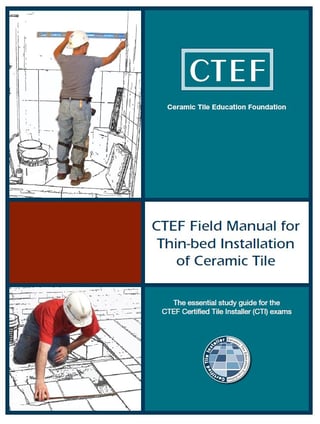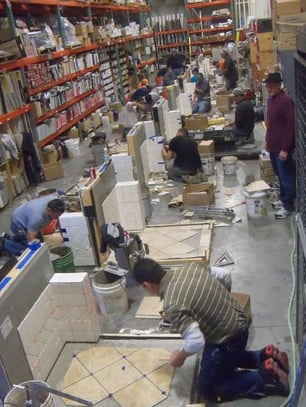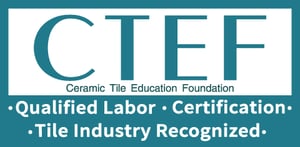Becoming a Certified Tile Installer: What's Involved?
What is Tile Installation Certification?
- Certification enables professional tile installers to provide industry-recognized proof of their abilities and secure more work.
- Certification is the validation of the skills and knowledge of the men and women who presently are installing tile successfully in the United States.
(Do you already know everything you need to know and can't wait to register to become a CTI? Just click on the button!)
Certified Tile Installer (CTI) Program Overview
 CTEF launched the Certified Tile Installer (CTI) program in 2008 to provide a means for good, knowledgeable tile installers to verify their skills and promote themselves to potential clients and employers. At the same time, the program addresses a significant opportunity in the marketplace:
CTEF launched the Certified Tile Installer (CTI) program in 2008 to provide a means for good, knowledgeable tile installers to verify their skills and promote themselves to potential clients and employers. At the same time, the program addresses a significant opportunity in the marketplace:
- It provides consumers with a mechanism for identifying the level of proficiency of prospective tile installers and,
- It encourages them to use the best-qualified installers, creating a better opportunity for their tile project to be installed correctly from the beginning, and look beautiful for years to come.
The Certified Tile Installer (CTI) program is a comprehensive testing of the skills and knowledge of experienced tile installers which includes a multiple-choice exam and a hands-on test. Both are based on current industry standards and best practices for producing a sound installation that exhibits good workmanship. The tests, therefore, require that both the observable and non-observable characteristics of a finished installation are executed properly.
>> Please note: this is a test of ability and is not considered a training event.
Marketing Your CTI Certification
Installers who pass the written and practical hands-on exams receive the following packet of marketing tools that will provide consumers, architects, designers, and contractors with a recognizable standard of expertise:
- Certified Tile Installer Certificate
- Plastic Wallet Identification Card
- Certified Installer logo
- Consumer Brochures
- Listing on the CTEF Website
For example, certified installers may display the CTI logo on their business cards, vehicles, and clothing. Additionally, CTEF provides promotional brochures that encourage consumers and general contractors/builders to use certified installers.
>> Read 5 Benefits of Being a Certified Tile Installer
Watch this 2:31 minute video titled Learn about the Certified Tile Installer (CTI) Program:
Who should register for the CTI Program?
Any installer may take the Certified Tile Installer (CTI) exams if he or she has at least two years of experience as the lead installer setting ceramic tile on a full-time basis. Experience as a helper, improver, grouter, or finisher does not qualify for the two-year recommendation.
The CTI designation identifies the professional installer who has reached a level of proficiency to independently and consistently produce a sound tile installation that displays good workmanship.
For those who are not installing tile on a full-time basis, the two-year recommendation applies, though more total years of installation are needed to make up for the percentage of time not setting tile. For example, an installer who installs ceramic tile about 33% of the time should have six years of this experience.
Again, experience is defined as having full responsibility for substrate prep, layout, coordinating with other trades along with properly installing underlayment, tile, grouting, and sealant materials.
While we encourage all qualified and interested individuals to take advantage of the certification program, we offer a friendly caution to those who have not been setting tile for the minimum amount of time.
- To maintain the integrity of the CTI certification program, CTEF evaluators require strict attention to even the smallest of details.
- The installer must prove he or she can competently execute all phases of installation and consistently produce finished work that is functionally sound and exhibits a high level of workmanship that will satisfy the most discriminating clients.
The grading procedure allows very little latitude for technical errors or aesthetic flaws, as CTEF pledges to uphold certification as a meaningful symbol that consumers can trust. Typically, three to five years of tile setting experience is recommended to attain the knowledge and skills required.
Here's Why Adam Values Being a Certified Tile Installer
"As a new installation business in Lakeland Florida, I was presented with a challenge. The challenge was giving fair estimates of where I was to get paid for a professional job! Often I would be outbid by basement dollar bids, bids that barely would cover material costs.
At first, I didn’t know what to do! As I contemplated the situation I realized that lowering my estimates wasn’t the solution. At the same time, I realized that I wasn’t educating my prospective customers on what was involved in a professional tile installation job and the difference between myself - a CTI - and those who aren't and that I have gone through the necessary training to do a professional-quality job.
Once my customers came to appreciate the CTI certification, they felt comfortable paying someone who knows and practices the standards necessary for a quality tile installation.
What my CTI certification also does for me is weed out customers who aren’t willing to pay for quality and are only concerned about the bottom dollar; these customers are not the ones I want to do business with.
The CTI certification is highly beneficial and all tile installers should carry one!"
What is the CTI technical proficiency exam?
The technical proficiency exam is a 155-question, open book, multiple-choice test. Upon registration, applicants will receive the following study materials:
- TCNA Handbook for Ceramic, Glass, and Stone Tile Installation
- CTEF Field Manual for Thin-bed Installation of Ceramic Tile which includes references to American National Standard Specifications for the Installation of Ceramic Tile

To prepare for the exam, we encourage applicants to read the CTI manual and review the industry standards to have adequate time to complete the test. Exam topics include:
- Industry associations and industry standards
- Safety
- Concrete substrate considerations
- Wood substrate considerations
- Crack isolation membranes
- Backer boards
- Bonding materials
- Ceramic tile performance properties
- Tile installation workmanship standards and best practices
- Cementitious grout
- Movement joints
- Flexible sealants (caulks)
The review questions at the end of each chapter in the Manual are representative of the questions on the exam. Also included in each chapter is a glossary of terms and words used in that chapter.
A maximum of four hours may be taken for the CTI technical proficiency exam.
Here's Why Mike Became a CTI
"I wanted to do everything I could to set myself apart from the thundering herd of setters (most of which were mediocre in their tile installation skills). I wanted nothing to do with living in a world that allows mediocrity to self-destruct those who accept mediocrity.”
About the test, he says:
“In my opinion, [the test] must have been designed to fail the student that didn't have time in the field and to reward the student that was experienced. If one didn't think ahead, the hands-on tasks would lead to a dead end, and then there was no time to finish it, which would lead to failure.”
Finally,
“Officials are clearly stating techniques and methods to accommodate the newer tile trends, which call for more sophisticated installation systems. And finally, they are mandating/specifying the use of CTI tile crews to provide a better chance of a successful installation of their project. Certification is paramount to the tile industry. “
What is the CTI hands-on test?
The hands-on test allows CTEF evaluators to verify that an applicant has the skills to deliver an installation that meets industry performance and workmanship standards.
Installers must demonstrate their ability to execute a complex layout and proper installation of vapor retarder membrane, backer board, tile (walls and floors), cementitious grout, and flexible sealant (caulk). For each installation material, the applicant is scored on the various aspects of workmanship relevant to producing an installation that will endure use and satisfy the discriminating client.

The hands-on portion of the testing is generally taken at a warehouse facility of a product manufacturer, distributor, or contractor.
During the hands-on test, angle grinders, circular saws, and cell phones will not be permitted on site.
>> Meet the CTI hands-on test hosts and learn about their locations
CTEF will bring the CTI hands-on test to any site in the United States that has registered five qualified tile installers.
>> Be sure to explore the Frequently Asked Questions.
What is the Cost of the CTI Program?
The registration cost is $629 per installer for the hard copies of the study materials. Registration covers both the online and hands-on tests.
Installers who successfully complete and pass both the online and hands-on tests will receive a packet that includes manufacturer coupons valued at over $1,000.
>> For more information, explore the Frequently Asked Questions.
Want to Learn More?
Check out the Free Online Video Preparation Program that's available. It consists of eight videos.
And, to further help determine if you qualify, download the CTI Kit and learn more about becoming a Certified Tile Installer.
Ready to Register for the Certified Tile Installer (CTI) Program?
Click on the button below. If you have any questions, contact Cathey McAlister at (864) 222-2131 or cathey@tilecareer.com.

